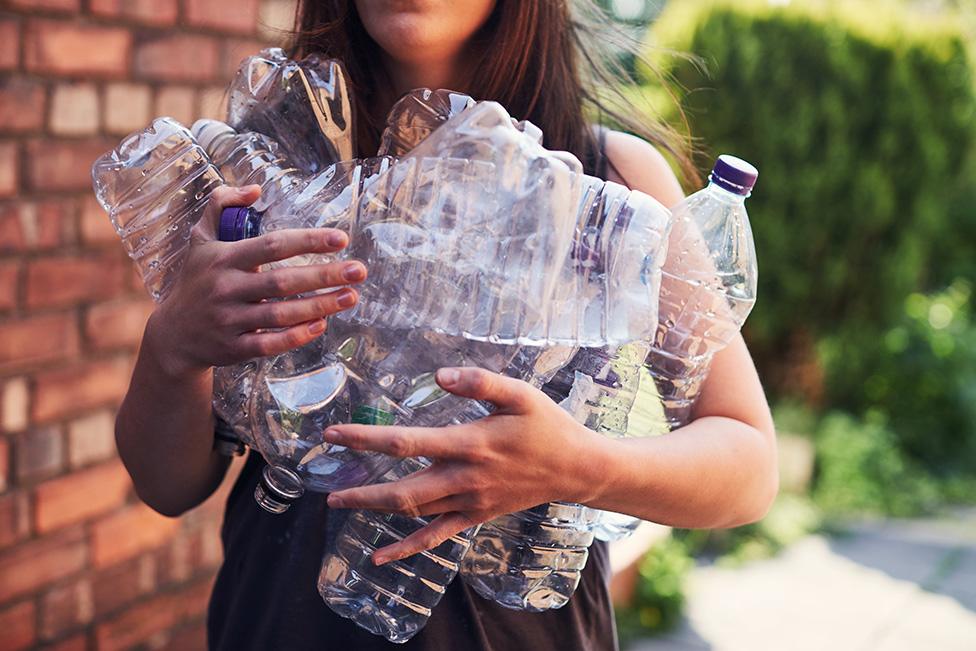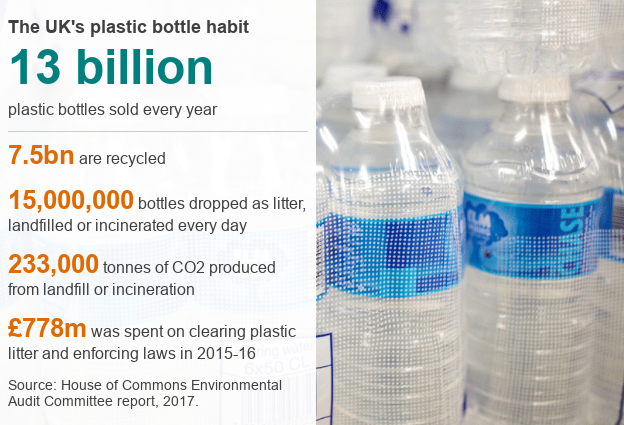What's holding up Scotland's bottle deposit scheme?
- Published
- comments

The scheme will apply to all types of drinks in containers between 50ml and three litres in size
Scotland's bottle return scheme seems likely to suffer further days, with the Scottish government blaming Covid-19, Brexit and a row over tax rules.
The scheme will add 20p to the price of products sold in some plastic drinking containers, cans and glass with the money being refunded when the containers are returned.
The government originally outlined its plans in 2017, saying it represented "a step change in our level of ambition" for recycling
Ministers had originally hoped the scheme would start in April 2021, but this was pushed back to July 2022, with the government blaming the pandemic.
It is now widely expected to be delayed again after Circular Economy Minister Lorna Slater told MSPs that a number of other issues were holding up the system, including Brexit.
She also claimed there had been a "lack of clarity" from the UK government over the tax status of the 20p deposits.
Ms Slater insisted that the government remains fully committed to implementing the scheme - but would not give a timescale for when it would actually happen.
Environmental group Greenpeace has been critical of the government, external, saying that a further delay would mean "millions more cans and bottles needlessly dumped and burned".
And opposition parties have said it as an example of the government's environmental rhetoric not being matched by its actions.
What type of containers will be included in the scheme?
The scheme will apply to all types of drinks in containers between 50ml and three litres in size.
Glass containers have been included in the scheme, despite some criticism from the glass industry.
The Scottish government has said that HDPE-made plastic bottles, which are typically used to carry milk, will not be included.
However, containers made from polyethylene terephthalate (PET) - which typically carry fizzy drinks and water - will be subject to the deposit return.
How will it work?
Effectively, 20p - the deposit - will be added to the price of a single-use drinks container bought from a shop.
The consumer will get their deposit back when they return the empty bottle or can to the retailer.
The scheme will operate throughout Scotland, including rural areas and all retail outlets will have to comply, regardless of size.
Businesses selling drinks which are opened and consumed on site - such as pubs and restaurants - will not have to charge the deposit to the public.
How will I get my deposit back?
There will be two ways you can return your empty container - over the counter, or by using a reverse vending machine (RVM).
An RVM is a machine that scans containers when they are returned and then refunds your deposit.
The government says there will be a range of ways you can get your 20p back, for example cash at a till, a token or discount voucher or digitally. The returned containers are stored in the machine and are then collected for recycling.
As well as retailers and hospitality businesses, schools and other community hubs will be able to act as return locations.
Who will be in charge of this scheme?
The government says an independent, privately-run, not-for-profit company will be in charge.
It adds that the system will be paid for through three sources of funding - unredeemed deposits, revenue from the sale of materials and a producer fee.

Is this also happening in the rest of the UK?
Scotland could still be the first nation in the UK to introduce a bottle deposit return scheme as recycling is a devolved issue.
A consultation on the introduction of a similar scheme in England, Wales and Northern Ireland was carried out by the UK government last year, external.
A four-week pilot for a deposit return scheme was recently run in Conwy in north Wales.